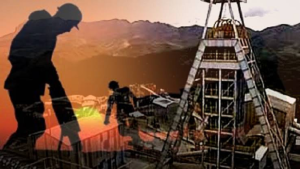South Africa unveiled a new regulatory charter for its mining industry on Thursday, a crucial step to attracting further investment to a sector laid low by depressed prices, soaring costs and murky policy.
It is part of an affirmative action drive to reverse black people’s exclusion from the mainstream economy under apartheid and pointedly targets the mining industry, which accounts for about 8 percent of the country’s gross domestic product now, but laid the foundations for Africa’s most industrialised economy.
Presented by Resources Minister Gwede Mantashe, the third version of the charter requires miners to provide their local communities and employees with a free 10 percent stake, a policy some companies may be pressed to bear but which unions say is needed to secure social peace.
“Regulatory and policy uncertainty is removed. We have a duty now to mobilise investment into mining,” Mantashe, a gruff former trade unionist and senior member of the ruling African National Congress (ANC), told a media briefing.
The charter raises the level of black ownership as expected to 30 percent from 26 percent while providing breakdowns on how the stakes should be divided, with 20 percent for black business interests and 5 percent each for communities and employees.
“The community/employee stake is a 10 percent investment in peace and stability. Current levels of mine community unrest and high number of industrial action creates a high level of instability,” Gideon du Plessis, the head of the Solidarity trade union which represents skilled workers, told Reuters.
Mining operations in the world’s top platinum producer which also exports gold, coal, diamonds and iron ore are flashpoints of social and labour unrest amid perceptions that the wealth flowing from the shafts does not benefit local communities.
For example, between the start of 2016 and April 2018, the eastern limb of the platinum belt was hit by over 400 incidents of social unrest impacting mining operations, according to data compiled by Anglo American Platinum.
The Minerals Council South Africa, which represents most of the country’s mining companies, said it would comment later after it has studied the document.
Among the controversial provisions in previous drafts that were dropped was one that would have required companies to pay 1 percent of earnings before interest, depreciation and amortisation to employees and communities if no dividends were paid for six years.
At the board level and among top management, the charter requires 50 percent black representation and 20 percent female representation.






